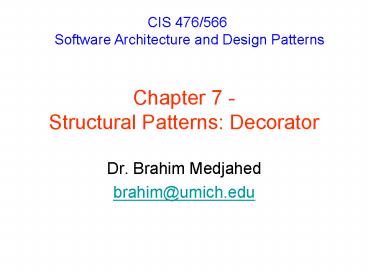Chapter 7 Structural Patterns: Decorator - PowerPoint PPT Presentation
1 / 31
Title:
Chapter 7 Structural Patterns: Decorator
Description:
What Are Structural Patterns? Structural Patterns ... 'Head First Design Patterns' by Bert Bates, Elisabeth Freeman, Eric Freeman, Kathy Sierra ... – PowerPoint PPT presentation
Number of Views:488
Avg rating:3.0/5.0
Title: Chapter 7 Structural Patterns: Decorator
1
Chapter 7 -Structural Patterns Decorator
CIS 476/566 Software Architecture and Design
Patterns
- Dr. Brahim Medjahed
- brahim_at_umich.edu
2
Design Patterns in GoF The Big Picture
3
What Are Structural Patterns?
- Structural Patterns
- Deal with the composition of classes or objects
- Two categories
- Object structural patterns
- Describe ways to assemble objects (e.g.,
Decorator, Proxy) - Class structural patterns
- Use inheritance to compose classes (e.g.,
Adapter)
4
Decorator Pattern - Intent
- Attach additional responsibilities to an object
dynamically. - Provide a flexible alternative to sub-classing
for extending functionality. - Also Known As (AKA)
- Wrapper
5
Motivating Example BestCafé
- BestCafé coffee shop with a large beverage
offering - Example inspired from Head First Design
Patterns by Bert Bates, Elisabeth Freeman, Eric
Freeman, Kathy Sierra - Offers four (4) beverages
- House Blend
- Dark Roast
- Decaf
- Espresso
6
BestCafé Initial Design
7
Additional Requirements
- Customers can also select condiments
- Milk
- Soy
- Mocha
- Topped with
- Whipped cream
- Each one has its own charge
8
Solution 1 Sub-classing
9
Solution 1 - Problems
- Explosion of classes!
- Maintenance nightmare
- What happens when price of milk goes up?
- Change code in all relevant subclasses
- What happens when new topping called caramel is
added? - Much more classes
10
Solution 2 Instance Variables
11
Solution 2 Class Diagram
12
Solution 2 - Problems
- What if the price of condiment changes?
- Change the code?
- Adding new condiments
- Change the super class
- We may have new beverages for which set of
condiments are not good. - What if customer wants double mocha?
13
Solution 3 Decorate Objects
- Take a DarkRoast object
- Decorate it with Mocha object
- Decorate it with Whip object
- Call the cost()
- Rely on delegation to add condiments cost.
14
Solution 3 Decorate Objects (contd)
- We start with DarkRoast object
- The customer wants Mocha.
- Create Mocha and wrap it with DarkRoast
15
Solution 3 Decorate Objects (contd)
- The customer wants Whipped Cream
- Create a WhippedCream object and wrap it with
Mocha
16
Solution 3 Decorate Objects (contd)
Total Cost 1.29
0.10
.99
0.20
17
Decorator Pattern - Structure
Each component can be used on its own or wrapped
by a decorator
Each decorator HAS-A (wraps) a component. It has
an instance variable that refers to that component
Objects we are going to dynamically add behavior
to.
18
Decorator Pattern - Participants
- Component
- Defines the interface for objects that can have
responsibilities added to them dynamically - ConcreteComponent
- Defines an object to which additional
responsibilities can be attached - Decorator
- Maintains a reference to a component object and
defines an interface that conforms to Components
interface - ConcreteDecorator
- Adds responsibilities to the component
19
BestCafé UML Class Diagram
20
Decorator Pattern - Applicability
- Add responsibilities to objects dynamically and
transparently - Responsibilities that can be withdrawn
- When extension by sub-classing is impractical
- Explosion of subclasses
- Class definition hidden or unavailable
21
Decorator Pattern - Collaborations
- Decorator forwards requests to its Component
object. - It may optionally perform additional operations
before and after forwarding the request
22
Implementation - Example
- Implement UML class diagram in slide 17
- Operation() in ConcreteComponent displays Im
concrete component - Operation() in ConcreteDecoratorA displays Im
concrete Decorator A - Operation() in ConcreteDecoratorB displays Im
concrete Decorator B
23
Implementation Example (contd)
- // MainApp test application class
MainApp static void Main() //
Create ConcreteComponent and two Decorators
ConcreteComponent c new
ConcreteComponent() ConcreteDecoratorA d1
new ConcreteDecoratorA() ConcreteDecorato
rB d2 new ConcreteDecoratorB() // Link
decorators d1.SetComponent(c) d2.Set
Component(d1) d2.Operation()
24
Implementation Example (contd)
- // "Component" abstract class
Component public abstract void
Operation() // "ConcreteComponent"
class ConcreteComponent Component pu
blic override void Operation() Console
.WriteLine(Im Concrete Component()")
25
Implementation Example (contd)
- // "Decorator" abstract class Decorator
Component protected Component
comp public void SetComponent(Component
comp) this.comp comp pub
lic override void Operation() componen
t.Operation()
26
Implementation Example (contd)
- // "ConcreteDecoratorA" class
ConcreteDecoratorA Decorator public
override void Operation() base.Operati
on() Console.WriteLine(Im Concrete
Decorator A") - // "ConcreteDecoratorB" class
ConcreteDecoratorB Decorator public
override void Operation() base.Operati
on() Console.WriteLine(Im Concrete
Decorator B")
27
Exercise 1
- Implementation of BestCafé
- Cost() returns the price of the corresponding
beverage/condiment - Prices hard-coded in the methods
- Main application
- Create a Dark Roast decorated with double mocha
then Whipped Cream
28
Exercise 1 - Implementation
- To be done in class
29
Exercise 2
- Window abstract class
- Has one abstract method draw()
- SimpleWindow is a subclass of Window
- draw() displays Simple Window
- Two possible concrete decorators
- VerticalScrollBarDecorator
- draw() displays with vertical scroll bar
- HorizontalScrollBarDecorator
- draw() displays with horizontal scroll bar
- Main Application
- simple window with horizontal scroll bar with
vertical scroll bar
30
Exercise 2 UML Class Diagram
- To be done in class
31
Exercise 2 Implementation
- To be done in class































